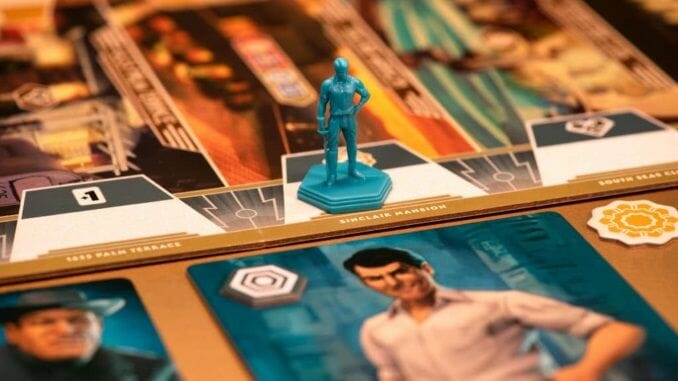Take Down Spies, Saboteurs, Fascists, and All of the Above in the New Rocketeer Board Game
Images courtesy of Funko Games / Disney
Funko might be better known for its miniatures, but two years after they acquired the board game design collective Prospero Hall, they’re churning out games that take advantage of the new parent company’s extensive licensing agreements. One of their latest titles is The Rocketeer, based on the cult classic Disney film from 1991 (which is supposed to get a sequel on Disney+ next year, what a coincidence!), a two-player asymmetrical game where you play the title character or the spy Neville Sinclair, competing over the secret Plans for the Rocketeer’s jetpack.
Bringing mechanics very similar to those of Prospero Hall’s Villainous games to art that evokes the movie’s setting from 1930s Los Angeles, The Rocketeer is very much a tit-for-tat game: You’re going to try to play cards to knock over your opponent’s figures so you can steal the Plans, and then they’ll do the same thing back to you. The Rocketeer player starts the game with the Plans cards—the real plans and two decoy cards, placed face-down behind that player’s three character cards. The game plays out over a short, variable number of rounds, after which players add up the values of their Finale cards, collected throughout the game, to determine the winner.
The two players have different decks of cards, and some small differences in the bonuses they collect during the game, but the core mechanics are the same for both players. Each has three miniatures on the board, representing characters from the movie, who will move among the board’s six locations (like Chapel Airfield, the South Seas Club, and the Bulldog Café). Each player takes a turn for one of those characters, playing as many cards as they want from their hand, as long as those cards show the correct symbol for that character. The turn passes to the other player, and back again, until all six characters have gone. The players start each turn with seven cards, and may play as many of them as they’d like in each round. Each card has generic actions you can take for free—move, tussle, gain a Clout or Grit token, and so on—and abilities that usually require that you pay Clout to use them. At the end of each round, you’ll see if any player has control of each location, meaning they have the majority of figures on it who are still active, earning them a small bonus.
